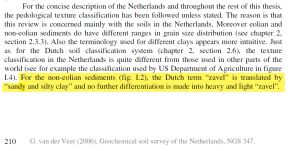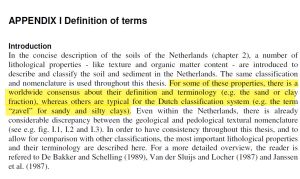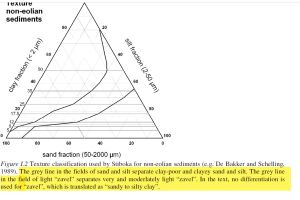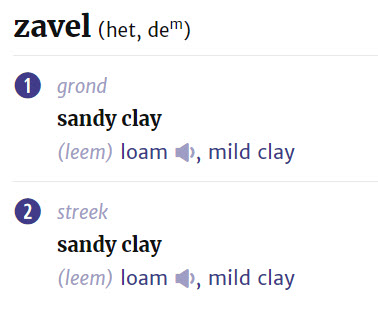No edit summary |
No edit summary |
||
| Line 18: | Line 18: | ||
[[File:zavel-van-dale.jpg]] | [[File:zavel-van-dale.jpg]] | ||
=== | === References === | ||
* https://en.wiktionary.org/wiki/zavel | * https://en.wiktionary.org/wiki/zavel | ||
* https://dspace.library.uu.nl/bitstream/1874/13275/24/app1.pdf (the thumbnail images on this page are from this document) | * https://dspace.library.uu.nl/bitstream/1874/13275/24/app1.pdf (the thumbnail images on this page are from this document) | ||
* https://london-brussels.blogspot.com/2009/05/place-du-petit-sablon.html (The name “sablon” refers to the yellowish earth layer that could be seen along the shoulders of the dirt roads. This type of '''sandy clay''' '''was''' '''called "zavel" in Dutch''' and "sablon" in French. In the 14th century a small chapel in the sablon area was transformed into an important pilgrimage site where a miraculous statue of Our Lady was venerated.) | |||
=== Examples === | === Examples === | ||
Revision as of 12:41, 1 December 2023



Dutch
- zavel
English
- coarse sand (GWIT)
- sandy clay (Van Dale)
- sand (finely ground rock)[1]
- (chiefly Southern) sand (Wiktionary)
- soil consisting mostly of sand with significant to high levels of clay (Wiktionary)
- sandy clay [Dutch source term: zavel]
Van Dale
References
- https://en.wiktionary.org/wiki/zavel
- https://dspace.library.uu.nl/bitstream/1874/13275/24/app1.pdf (the thumbnail images on this page are from this document)
- https://london-brussels.blogspot.com/2009/05/place-du-petit-sablon.html (The name “sablon” refers to the yellowish earth layer that could be seen along the shoulders of the dirt roads. This type of sandy clay was called "zavel" in Dutch and "sablon" in French. In the 14th century a small chapel in the sablon area was transformed into an important pilgrimage site where a miraculous statue of Our Lady was venerated.)
Examples
| Dutch | English | Source |
|---|---|---|
| - | - | - |
